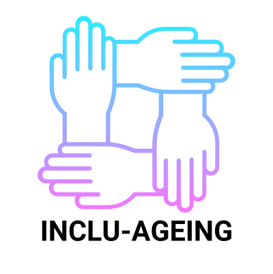As societies worldwide grapple with the challenges posed by an aging population, innovative solutions are crucial to ensure inclusivity, well-being, and dignity for adults and aging people with disabilities. In response to this pressing need, the consortium of the Inclu-ageing project is implementing pilot activities to test the material produced to pioneer inclusive strategies that enhance the quality of senior and adults with disabilities. In this article, we delve into the insights gleaned from the pilot phase carried out in Palermo by CEIPES ETS in the Retirement Home “Madre del Divino Amore”.
The pilot phase of the Inclu-ageing project focused on testing various interventions and methodologies in real-world settings to assess their effectiveness and feasibility, such as the laughter yoga, activities to prevent the cognitive decline and the test of the learning HUB. Key components of this phase included:
- Community Engagement: Recognizing the importance of social connections in promoting well-being, the project sought to strengthen community ties and facilitate intergenerational interactions.
- Policy and Advocacy: The pilot phase also entailed advocacy efforts aimed at influencing policy decisions and fostering a more age-inclusive society. This included research studies, policy briefs, and stakeholder consultations to identify barriers to inclusion and propose actionable recommendations for policy reform.
Through rigorous evaluation and stakeholder feedback, several key insights emerged from the pilot phase:
- Tailored Approaches: One size does not fit all when it comes to addressing the needs of the target group. Customized interventions that take into account individual preferences, abilities, and socio-cultural backgrounds are essential for promoting inclusivity and engagement.
- Holistic Support: Addressing the diverse needs of older adults requires a holistic approach that encompasses physical, mental, and social well-being. Interventions that integrate healthcare, social services, and community support are more likely to yield positive outcomes and enhance overall quality of life.
- Technology Literacy: While technology holds immense potential in improving the lives of seniors, there is a need for targeted efforts to enhance digital literacy and accessibility. Providing training, technical support, and assistive technologies can empower older adults to embrace and leverage technology effectively.
As the pilot phase draws to a close, the Inclu-ageing project is poised to scale up its initiatives and expand its reach to a broader audience. Building on the insights and learnings gleaned from the pilot phase, the next steps will focus on refining interventions, scaling successful models, and advocating for policy reforms that promote age-inclusive practices across sectors.

